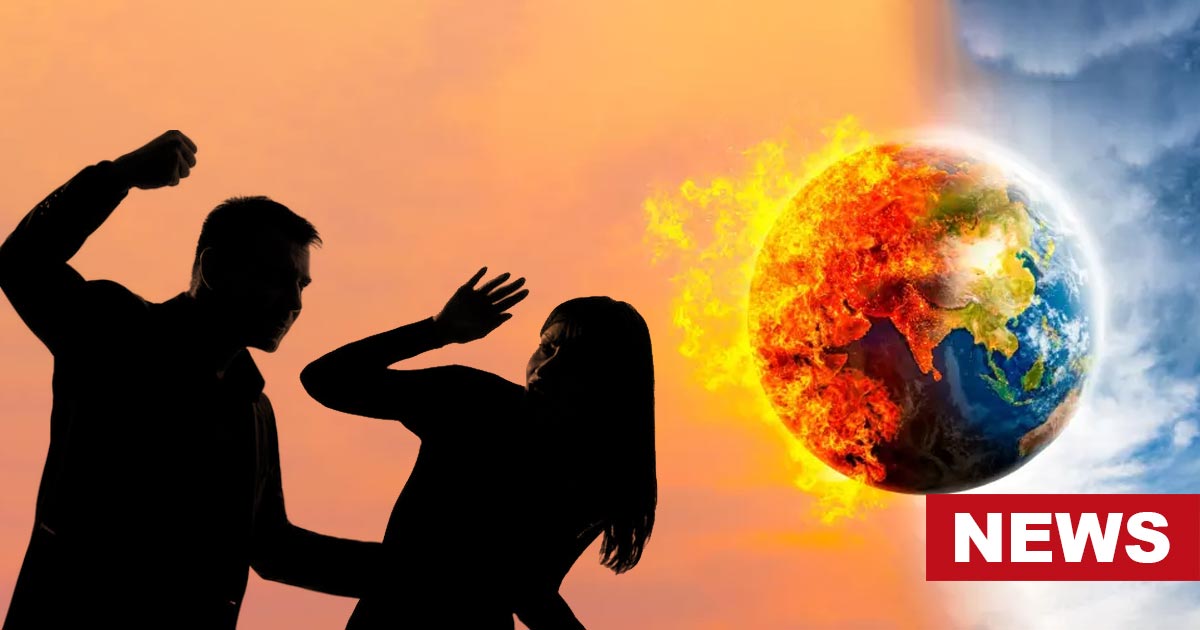A recent study published in the journal JAMA Psychiatry has revealed a concerning reality: Heatwaves cause domestic violence incidences to rise in South Asian countries. The study, conducted in South Asia and spanning the years 2010 to 2018, focused on India, Pakistan, and Nepal, saw numerous girls and women share their experiences of emotional, physical, and sexual violence.
The findings went on to suggest that if no action is taken to limit global warming and climate change, India could experience the highest rate of violence against women among the three countries studied by the 2090s.
According to the study, a mere one-degree Celsius increase in average annual temperature was associated with a staggering 6.3% rise in incidents of physical and sexual domestic violence across the three nations.
The researchers closely monitored 194,871 girls and women aged 15 to 49 to examine the prevalence of intimate partner violence (IPV) encompassing various types, such as physical, sexual, and emotional violence. They discovered a significant correlation between higher ambient temperatures and a higher prevalence of IPV against women. Each one-degree Celsius rise in the annual mean temperature was found to correspond to a total IPV prevalence increase of 4.49%.
The study also projected a potential increase of up to 21% in IPV prevalence by the end of the century under the “unlimited emissions scenarios” and burgeoning occurrences of heatwave in India and the neighboring countries.
However, if effective measures are implemented to reduce emissions and address climate change and domestic violence, the researchers anticipate a more moderate increase in IPV prevalence. Notably, the study highlighted that physical violence (28.3%) and sexual violence (26.1%) exhibited significantly higher rates than emotional violence (8.9%).
Michelle Bell, a co-author of the study and a professor of environmental health at Yale University, provided more insights into the association between heatwaves and mental health issues. She emphasized that higher temperatures could impact the risk of violence through various physiological and sociological pathways.
Extreme heat triggers a cascade of socioeconomic consequences—including crop failures, income disruptions, and forced confinement at home without means of livelihood—placing tremendous financial stress and survival pressure on households.
High temperatures and mental health are also inversely related, triggering severe mental health conditions like long-term depression, chronic anxiety, aggression, and behavioral issues. Patriarchal values and social blame-shifting means the likelihood of violence against women further amplifies.
The research also revealed that IPV is more prevalent in lower-income and rural households compared to higher-income groups when it comes to heat-related increases in violence.
The study’s findings align with the growing body of evidence suggesting that extreme heat can induce stress, diminish inhibitions, escalate aggression, and exacerbate mental health issues.
India, in particular, is projected to experience the highest IPV prevalence in the 2090s, reaching 23.5%, surpassing Nepal (14.8%) and Pakistan (5.9%). India’s heatwaves have already caused a rise in heat-related deaths, as temperatures soared up to 45 degrees Celsius in certain regions earlier this year.
For instance, activist Suniti Gargi, a former employee of Uttar Pradesh’s Commission for Women, has drawn attention to how heat triggers domestic violence in rural India.
In an interview with The Guardian, she explained how economic stress and frustration propel domestic violence. Gargi said: “I’ve been seeing unusually high temperatures becoming more common. They cause tremendous economic stress in families. If a man can migrate to another state to get work, it can help keep the home fires burning but when he cannot for whatever reason, his wife is at the receiving end of his anger and feelings of uselessness.”
The research conducted by Fudan University in Shanghai contributes to an expanding body of environmental literature that highlights how heatwaves cause domestic violence and create an unsafe world for women. The study also campaigns for the urgent need to address climate change and its far-reaching mental health consequences that do not meet the eye .i.e., domestic violence and women’s safety.




























